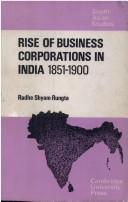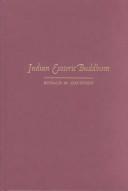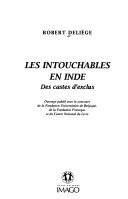| Listing 1 - 10 of 145 | << page >> |
Sort by
|
Book
ISBN: 9782130586494 213058649X Year: 2011 Volume: 489 Publisher: Paris: PUF,
Abstract | Keywords | Export | Availability | Bookmark
 Loading...
Loading...Choose an application
- Reference Manager
- EndNote
- RefWorks (Direct export to RefWorks)
En ce début de troisième millénaire, l'Inde, l'une des plus anciennes civilisations du monde, a largement passé le milliard d'habitants. Elle est également le seul pays du Tiers Monde régi, sans interruption depuis son indépendance en 1947, par une démocratie laïque. Quel avenir peut-on espérer pour ce sous-continent, aussi puissant qu'il paraît parfois fragile ? Cet ouvrage en retrace l'histoire, depuis ses origines préhistoriques jusqu'à la formation d'une république indépendante, exemple unique au monde de la construction progressive d'une identité politique distincte du modèle de l'État-nation.
India --- History --- India - History
Book
ISBN: 9780802145581 0802145582 0802195504 Year: 2010 Publisher: New York: Grove press,
Abstract | Keywords | Export | Availability | Bookmark
 Loading...
Loading...Choose an application
- Reference Manager
- EndNote
- RefWorks (Direct export to RefWorks)
India --- History --- India - History
Book
ISBN: 2253016551 9782253016557 Year: 1975 Volume: 4941 Publisher: Paris: Librairie générale française,
Abstract | Keywords | Export | Availability | Bookmark
 Loading...
Loading...Choose an application
- Reference Manager
- EndNote
- RefWorks (Direct export to RefWorks)
Gandhi, --- India --- History --- India - History - 1947 --- -India - History - 1947 --- -Gandhi,

ISBN: 0856684880 9780856684883 Year: 1990 Publisher: Warminster: Aris and Phillips,
Abstract | Keywords | Export | Availability | Bookmark
 Loading...
Loading...Choose an application
- Reference Manager
- EndNote
- RefWorks (Direct export to RefWorks)

ISBN: 0521073545 9780521073547 Year: 1970 Volume: 8 Publisher: London: Cambridge university press,
Abstract | Keywords | Export | Availability | Bookmark
 Loading...
Loading...Choose an application
- Reference Manager
- EndNote
- RefWorks (Direct export to RefWorks)
Book
ISBN: 8185002061 9788185002064 Year: 1987 Publisher: New Delhi: Promilla,
Abstract | Keywords | Export | Availability | Bookmark
 Loading...
Loading...Choose an application
- Reference Manager
- EndNote
- RefWorks (Direct export to RefWorks)
Anjuna (India) --- History. --- History --- Anjuna (India) - History

ISBN: 0231126190 9780231126182 0231126182 9780231126199 Year: 2002 Publisher: New York: Columbia university press,
Abstract | Keywords | Export | Availability | Bookmark
 Loading...
Loading...Choose an application
- Reference Manager
- EndNote
- RefWorks (Direct export to RefWorks)
Tantric Buddhism --- History. --- Tantric Buddhism - India - History.
Book
ISBN: 9780198732662 019873266X 0191047058 0191796875 019104704X Year: 2018 Publisher: Oxford: Oxford university press,
Abstract | Keywords | Export | Availability | Bookmark
 Loading...
Loading...Choose an application
- Reference Manager
- EndNote
- RefWorks (Direct export to RefWorks)
"Jan Westerhoff unfolds the story of one of the richest episodes in the history of Indian thought, the development of Buddhist philosophy in the first millennium CE. He starts from the composition of the Abhidharma works before the beginning of the common era and continues up to the time of Dharmakirti in the sixth century. This period was characterized by the development of a variety of philosophical schools and approaches that have shaped Buddhist thought up to the present day: the scholasticism of the Abhidharma, the Madhyamaka's theory of emptiness, Yogacara idealism, and the logical and epistemological works of Dinnaga and Dharmakirti. The book attempts to describe the historical development of these schools in their intellectual and cultural context, with particular emphasis on three factors that shaped the development of Buddhist philosophical thought: the need to spell out the contents of canonical texts, the discourses of the historical Buddha and the Mahayana sutras; the desire to defend their positions by sophisticated arguments against criticisms from fellow Buddhists and from non-Buddhist thinkers of classical Indian philosophy; and the need to account for insights gained through the application of specific meditative techniques. While the main focus is the period up to the sixth century CE, Westerhoff also discusses some important thinkers who influenced Buddhist thought between this time and the decline of Buddhist scholastic philosophy in India at the beginning of the thirteenth century. His aim is that the historical presentation will also allow the reader to get a better systematic grasp of key Buddhist concepts such as non-self, suffering, reincarnation, karma, and nirvana."--
Buddhist philosophy --- Philosophy --- History --- Philosophy - India - History

ISBN: 2902702914 9782902702916 Year: 1995 Publisher: Paris: Imago,
Abstract | Keywords | Export | Availability | Bookmark
 Loading...
Loading...Choose an application
- Reference Manager
- EndNote
- RefWorks (Direct export to RefWorks)
Dalits --- Caste --- Intouchables --- Castes --- History. --- Untouchables --- India --- Dalits - India - History. --- Caste - India - History.
Book
ISBN: 9780226895130 0226895130 9786612679391 0226895157 1282679392 9780226895154 9781282679399 Year: 2009 Publisher: Chicago: University of Chicago press,
Abstract | Keywords | Export | Availability | Bookmark
 Loading...
Loading...Choose an application
- Reference Manager
- EndNote
- RefWorks (Direct export to RefWorks)
Since the 1960s, yoga has become a billion-dollar industry in the West, attracting housewives and hipsters, New Agers and the old-aged. But our modern conception of yoga derives much from nineteenth-century European spirituality, and the true story of yoga's origins in South Asia is far richer, stranger, and more entertaining than most of us realize.To uncover this history, David Gordon White focuses on yoga's practitioners. Combing through millennia of South Asia's vast and diverse literature, he discovers that yogis are usually portrayed as wonder-workers or sorcerers who use their
Yogis --- Yoga. --- History. --- Yogis - India - History. --- Yogis -- India -- History. --- Yoga --- Religion --- Eastern Religions --- Philosophy & Religion --- History
| Listing 1 - 10 of 145 | << page >> |
Sort by
|

 Search
Search Feedback
Feedback About UniCat
About UniCat  Help
Help News
News